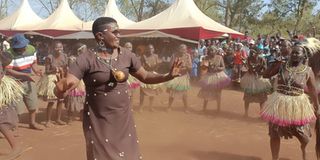Woman Rep wants traditional brews legalised

Tharaka-Nithi County Women Representative Susan Ngugi dancing during Tharaka Cultural Exhibition in Nkondi ward on October 15, 2022.
Tharaka Nithi Women Representative Susan Ngugi has called on the government to legalise the Tharaka community's traditional brews, locally known as uki and maroa.
Speaking during the Tharaka Cultural Exhibition in Nkondi ward, Tharaka constituency, at the weekend, Ms Ngugi said uki and maroa, which are made from honey and millet, respectively, are safer than conventional alcoholic drinks.
Ms Ngugi said legalizing the traditional brews will reduce the consumption of industrial alcoholic drinks that are made with some chemicals harmful to humans.
“I am appealing to the government to consider lifting the ban on traditional brews like uki and maroa, which were used by our grandparents,” she said.
She said the government discouraged the use of traditional brews in order to collect taxes from conventional alcoholic drinks, some of which she said are dangerous to human health.
She said poor women could prepare the traditional brews and sell them to pay school fees for their children and meet other basic needs.
She claimed the idea that traditional brews are bad was inherited from the colonial government, which discouraged the drinks in order to introduce industrial beers.
The newly elected legislator also urged the government to allow people to produce charcoal for cooking and selling provided that they replace the cut trees.
She lamented that the government keeps arresting people and charging them for making charcoal while the rich are allowed to sell it in towns.
“The government charges poor people for cutting down trees to make charcoal, ignoring the fact that very few people can afford gas,” she said.
The cultural event was organised by local youths, led by Paul Kabithi, and is planned to happen annually.
It is aimed at preserving positive cultural activities and discouraging negative ones, Mr Kabithi said.
“The Tharaka community has a very rich culture which should be passed from one generation to another through such events,” he said.





